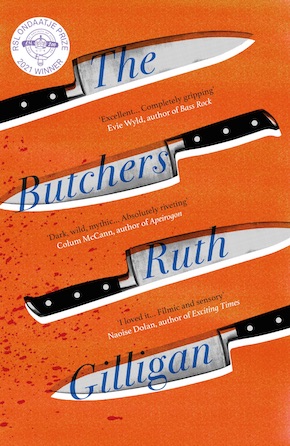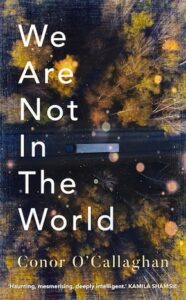Books as a Covid passport
by Ruth GilliganEarlier this year, my novel The Butchers won the 2021 RSL Ondaatje Prize, awarded to the book which best evokes ‘the spirit of a place’. The prize seems like a lovely thing at the best of times – I am a big believer in the transportive power of books – but this year it felt more relevant than ever. For the last eighteen months, readers have been able to escape the confines of the same four walls by simply picking up a book; even now, with the ongoing uncertainty around overseas travel, bookshops and libraries are our airports. Here are just ten lockdown novels that transported me far, far away.
Love After Love by Ingrid Persaud
Set in technicoloured Trinidad and told in lilting dialect, this sun-soaked story of an unconventional family was a ray of sunshine in a very dark year. The stunning scenery, the role of competing faith systems, the highs and lows of island life – I learned so much as I listened to the voices of Betty, her troubled son Solo and her lodger Mr Chetan. I also listened to my stomach rumbling – the descriptions of food were a particular highlight – until I was ordering Caribbean takeaway to savour alongside the final, heartbreaking chapters.
The Bass Rock by Evie Wyld
Evie Wyld’s third novel was published on the same day as The Butchers, back in March 2020, just as the world was falling apart. In between the footage of borders shutting and cases rising, and the emails about my publicity plans being cancelled, I found myself immersed in the salty wildness of the Scottish coast. The novel follows three generations of women, each haunted by grief and hunted by violent men, all under the looming shadow of the titular Rock. It is sinister and shocking and surprisingly funny, and I can still taste the sea breeze on my tongue.
Lean Fall Stand by Jon McGregor
Jon McGregor’s previous book, Reservoir 13, charted the intimate rhythms of village life, the ebb and flow of seasons and griefs; the cycle of new loves and old rivalries in a small community. Lean Fall Stand begins somewhere different entirely – somewhere jagged and harsh and utterly vast. Doc, Thomas and Luke are stationed at a research centre in Antarctica when they get caught in a violent snowstorm that ultimately claims one of their lives. McGregor’s ability to conjure this awesome, frozen landscape is astounding – who knew there were so many ways to describe whiteness? I was very gripped and very, very cold.
Between the vibrant palate, the musical patois and the ancient weave of Caribbean folklore, Monique Roffey’s The Mermaid of Black Conch completely caught me in its net.”
Florida by Lauren Groff
By contrast, Lauren Groff’s short story collection is a sweaty, sweltering, swampy affair. There are alligators in the water and snakes in the grass; there are cicadas buzzing in your ears and mosquitoes baying for your blood. I have visited the state only once – a trip to Miami in February 2020 that already feels like a lifetime ago – but this is another world, one where siblings turn feral and women flee rapists and mothers shelter their children from wild beasts lurking in the woods. The writing is lush and strange and gorgeously evocative.
Shuggie Bain by Douglas Stuart
Unlike some of the other books, Shuggie Bain didn’t necessarily make me want to visit 1980s Glasgow, but the meticulous way the world was drawn really was transportive. The black coating of soot on every surface; the smell of stale Special Brew; the taste of cold custard straight from the tin – Stuart captures every detail of the mining village where Shuggie and his family move to start a better life. And although they don’t necessarily succeed, in amidst the filthy fumes and traffic din, this is a novel burning bright with love.
The Mermaid of Black Conch by Monique Roffey
When I finally got round to reading Monique Joffey’s Costa Award-winning novel, I found myself transported to a small Caribbean fishing village. At its heart, the novel is a tale (or should I say tail?) of love between a fisherman and a mermaid, however, through Roffey’s deft and playful storytelling, it becomes so much more – a tale of colonialism and displacement; of migration and female subjugation; of capitalist greed and the inherent fear of otherness. Between the vibrant palate, the musical patois and the ancient weave of Caribbean folklore, this novel completely caught me in its net.
The protagonist of Jenn Ashworth’s wonderful new novel spends her days cleaning toilets in a deserted university campus and her nights getting drunk in a tiny high-rise flat. Neither place is particularly appealing, but the physical – and psychological – confinement feels so familiar, so acutely drawn, that when the protagonist does finally escape the release is so cathartic it had me in tears. A subtle and affecting novel about marriage and motherhood and the many different ways there are to disappear – and, indeed, to be found.
Memorial by Bryan Washington
Set between Houston and Osaka, Bryan Washington’s debut novel charts the complex relationship of Mike and his boyfriend Benson. Just as his mother, Mitsuko, arrives for a long-overdue visit, Mike absconds to Japan to be with his dying father, leaving her and Benson alone in the men’s cramped apartment. Switching between the couple’s respective points of view, the novel dissects questions of race, sexuality, family and belonging, as well as the vastly contradictory ways in which the same relationship can be viewed by its participants. It also offers a vivid portrait of Japanese culture – in the Osaka chapters, and in the array of Japanese dishes Mitsuko prepares for and, ultimately, teaches Benson, the noodles and broths forming a shared language of tenderness, of nostalgia and intimacy.
Hot Stew by Fiona Mozley
I already knew Fiona Mozley was good at place. Her debut novel Elmet, shortlisted for the 2017 Man Booker Prize, was set in a tiny patch of rural Yorkshire where a father and his two children try to build an entire world. The landscape was both idyllic and claustrophobic, nature a source of protection and isolation, the pages suffused with an undertow of gothic menace I tried to capture when I was working on The Butchers. Mozley’s second book, however, isn’t set in the countryside, it is set in London – Soho to be precise – a place which, in normal times, I can get to by twenty minutes on the Tube. But during the pandemic, Soho felt like another planet (and when I did once visit it felt like a ghost town), so I was all the more grateful for Hot Stew’s kaleidoscopic descriptions, a reminder of the capital at its seedy, diverse, decadent best.
We Are Not in the World by Conor O’Callaghan
Largely set on a haulage truck hurtling somewhere along a French motorway, Conor O’Callaghan’s second novel doesn’t so much boast a strong sense of place as a sense of ‘non-place’. Anonymous rest stops; dilapidated camping sites; featureless diners – our protagonist, Paddy, has taken this job precisely to disappear from focus and escape his previous life. Even the flashbacks we get of an old love affair take place in generic locations – unfurnished flats and suburban train stations; a grotty caravan; a layby beneath a nameless airport’s flight path. But eventually, through his heartache and grief (and his endless days on the road), Paddy begins to think back to his childhood home – a cottage on the west coast of Ireland, known as Tír na nÓg. Conjured in painstaking detail, this place ultimately calls him back, offering a way he might just manage to begin again.
 Ruth Gilligan is an Irish novelist and journalist who lives in London and lectures at the University of Birmingham. She has written five novels, including the Irish bestsellers Forget and Nine Folds Make a Paper Swan (Atlantic Books, 2016). She writes and reviews for the Irish Times, the Irish Independent, the TLS and the Guardian. The Butchers, the winner of the Royal Society of Literature Ondaatje Prize 2021, is out now in paperback from Atlantic Books.
Ruth Gilligan is an Irish novelist and journalist who lives in London and lectures at the University of Birmingham. She has written five novels, including the Irish bestsellers Forget and Nine Folds Make a Paper Swan (Atlantic Books, 2016). She writes and reviews for the Irish Times, the Irish Independent, the TLS and the Guardian. The Butchers, the winner of the Royal Society of Literature Ondaatje Prize 2021, is out now in paperback from Atlantic Books.
Read more
ruthgilligan.com
@RuthGilligan
@AtlanticBooks
Author portrait © Sophie Robinson



